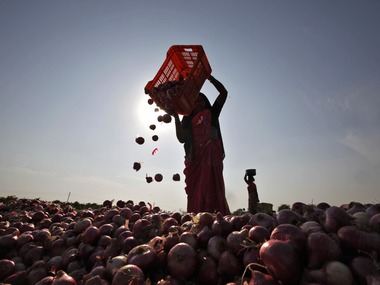Onion prices are rising and how? According to media reports, the prices of the most political vegetable in the country have risen about 60 percent over the last one month.
According to a Times of India report , wholesale traders of Rajasthan expect the prices to even hit Rs 100 per kg before the situation improves in February.
Onion in the wholesale market in Lucknow was at Rs 12 per kg two weeks back. On Saturday, it was Rs 26 per kg and is expected to touch Rs 30 in a couple of days, according to another report in the same newspaper.
Data from the National Horticultural Research and Development Foundation, quoted by this report in the Business Standard, gives a clearer – and scarier – picture of the price spiral.
[caption id=“attachment_612435” align=“alignleft” width=“380”] Union government is unlikely to impose a minimum export price (MEP) because it thinks the price rise is not demand-driven but due to supply constraints. Reuters[/caption]
Union government is unlikely to impose a minimum export price (MEP) because it thinks the price rise is not demand-driven but due to supply constraints. Reuters[/caption]
On Friday, wholesale price at Lasalgaon in Nasik, considered the largest onion market in Asia, was Rs 22 per kg, compared with Rs 14 kg a month ago and just Rs 4.13 a year ago.
For the common man the price spiral will be much more, as in the retail market the prices usually are double or more of that in the wholesale market.
If a wholesale trader buys the vegetable for Rs 20, he will sell it to a retail trader at around Rs 35, taking into account the transportation charge and the cut for the middle men. In effect, the price for a common man will be upwards of Rs 35.
So what is causing this price rise? Media reports say supply constraints.
According to the ToI report , the key reason for this is the rain deficiencyin Maharashtra, the largest producer of onion.
Adding to the demand is the wedding season, the report quotes Satish Sonkar, president of vegetables and fruits growers and sellers association in Lucknow as saying.
And precisely because of this, the government has no plans to re-impose the minimum export prices - a price below which exports are not allowed – on onion, which it had earlier abolished.
According to a report in the Economic Times today, S K Goel, Maharashtra’s additional chief secretary, has written a to the commerce secretary explaining that the present price rise is “due to a seasonal break in the arrival”. He expects the prices to be stable once the rabi onion hits the market.
Agriculture Minister Sharad Pawar is also reported to be against the re-imposition of MEP.
The price rise has, naturally (or should we say artificially?) resulted in a surge in black marketing and hoarding, which will further push up the prices in the next few days.
Experts, however, believe the key reason for such a situation is that India never fixes its problems once and for all.
“The same ghost from time to time reappears. The broader issue is that India does not really fix problems. The onion issue was there not even two years ago. Has the government done anything to fix such occurrences? The answer is no,” Rajeev Malik, senior economist of brokerage CLSA, has been quoted as saying in an ft.com article published on Moneycontrol.
The bottomline: We are at the mercy of hoarders. Grin and bear the high price until they start releasing their stock while the government will continue deliberating on short-term solutions for the problem.
)